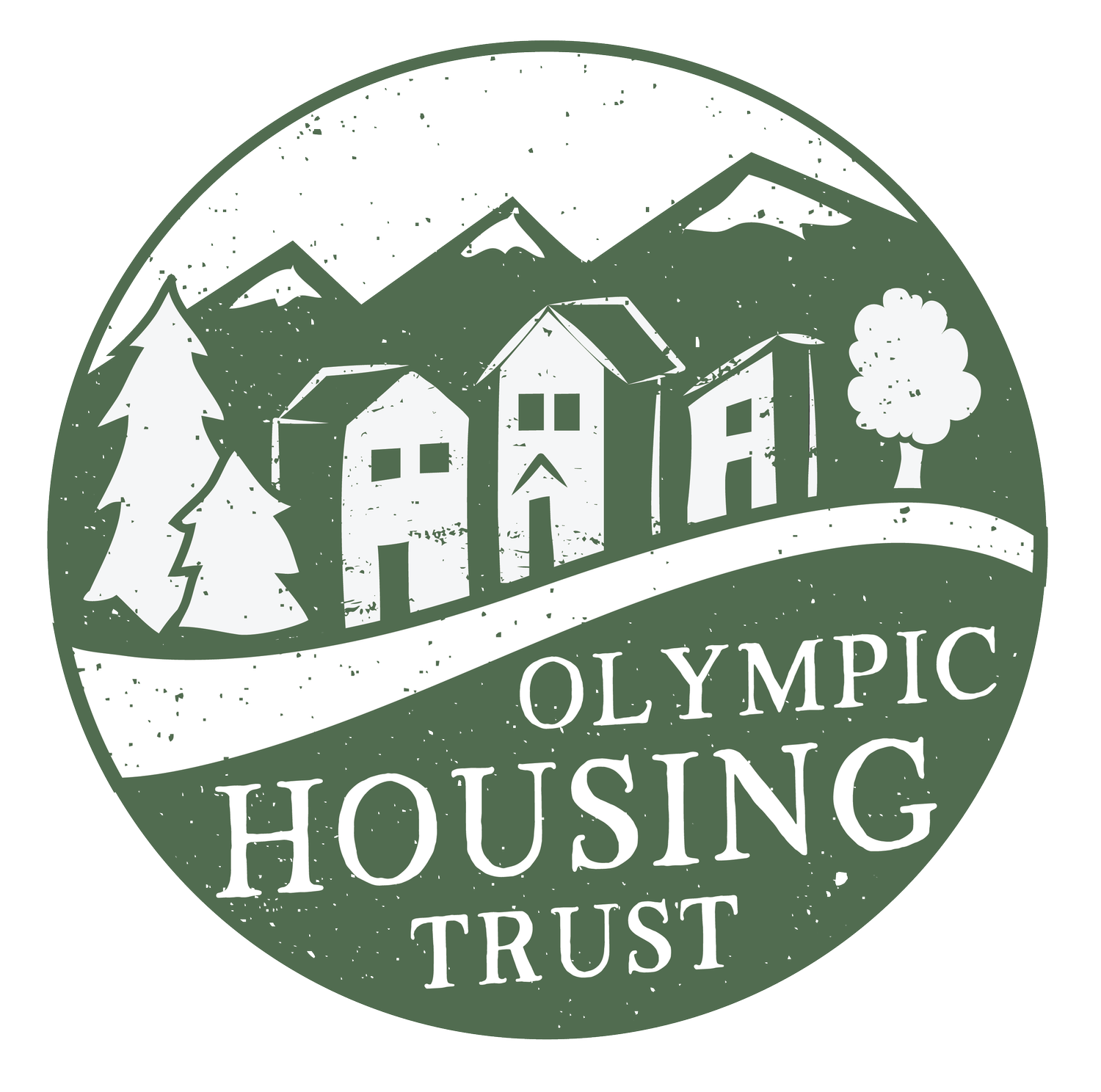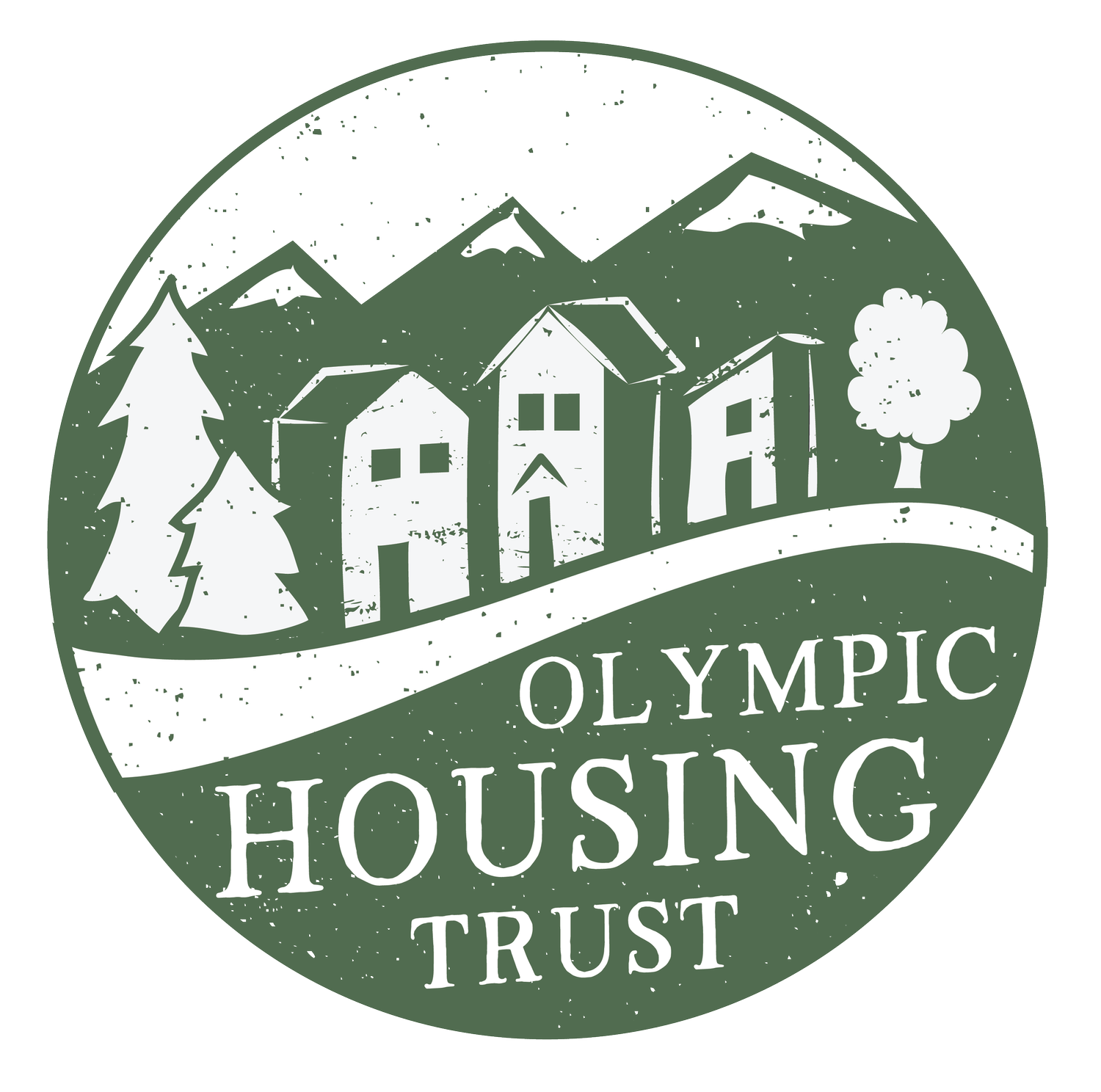What We Do
Enabling Permanent Affordability
Our Model
Olympic Housing Trust (OHT) is the only community land trust serving Jefferson and Clallam Counties. Our work focuses on creating permanently affordable homeownership opportunities and, increasingly, affordable rental housing for local residents.
A community land trust (CLT) is a nonprofit organization that acquires and stewards land for the long-term benefit of the community. By separating ownership of the land from the ownership of the home, a CLT ensures that housing remains affordable not just for the first buyer, but for every household that follows. In addition to housing, OHT also prioritizes shared community assets such as open space, gardens, and places that support connection and resilience.
OHT serves households who earn steady incomes but are increasingly priced out of both the rental and ownership markets. We use a combination of public and private funding to acquire land and develop housing that would otherwise be unattainable for local workers and families.
When a home is placed in the OHT portfolio, the land beneath it is held by the trust under a renewable 99-year ground lease. This structure allows homeowners to build equity while ensuring that the home remains permanently affordable for future buyers. Resale is guided by a shared-equity formula that provides homeowners with a modest annual appreciation—currently 1.5%—rewarding long-term residency while preventing speculative price escalation.
National data shows that approximately 60% of community land trust homeowners go on to purchase market-rate homes after selling their CLT home, demonstrating that this model can serve as a stable and effective pathway to long-term housing security.
Project Types
OHT develops homes for both ownership and rental through new construction, acquisition, and, when available, land or home donation. We prioritize projects that not only deliver housing, but also support broader community goals such as food production, shared open space, and long-term stewardship of land.
These values are reflected in both the Dundee Hill and Chimacum Commons projects, where housing is clustered to preserve open space and support community-oriented uses.
Dundee Hill will provide five permanently affordable homeownership opportunities for households earning up to 80% of Area Median Income (AMI).
Chimacum Commons will include a mix of affordable rental and ownership homes. Final income limits are still being determined.
Understanding Area Median Income
In 2025, the Area Median Income (AMI) for a household of four is $106,200 in Jefferson County and $90,400 in Clallam County.
The homes currently stewarded by OHT are owned by households who were at or below 80% of AMI at the time of purchase.
Most public housing programs restrict eligibility to households earning below 80% of AMI. While this support is essential, it leaves a significant portion of the local workforce unserved—households who earn too much to qualify for assistance but far too little to compete in today’s housing market.
In Jefferson County, where the median home price exceeds $650,000, a household typically needs to earn well over 200% of AMI to purchase a home on the open market. This gap has left many working households with no viable path to stable housing.
In response, OHT has expanded its internal service range to include households earning between 50% and 120% of AMI, where funding allows. However, public funding requirements still constrain many projects to lower income thresholds. As a result, expanding housing opportunities for moderate-income households will depend on philanthropic partners who recognize the importance of supporting the broader local workforce.
Source: Housing Solutions Network
*Home purchasing range is based on a 30 year mortgage financed at 6.6% with a 5% down payment and a private mortgage insurance rate of .85%. Payments include estimated property tax and estimated home insurance, and assume excellent credit and no other debt obligations.
Median Home Price was captured from RocketHomes.com
What to know about community land trusts (CLTs):
CLTs are able to offer permanently affordable housing through their model of subsidizing housing costs on the front end, and capping future home sales on the back end. This means that for homeownership opportunities, our organization owns the land under the home while the homeowner owns the house itself.
OHT, like many CLTs, utilizes a 1.5% fixed rate resale formula for deciding how much value a homeowner can earn in equity from a home sale.
CLTs are focused on the continuous active acquisition of land and development, not on one single project located on one single parcel of land.
The CLT operates within the targeting boundaries of its locale. Any adult who resides in the targeted local is able to become a voting member of the CLT following membership guidelines.
CLTs are found across the United States and around the entire world!
Our Promise
Stewarding Community: Housing trusts, also known as community land trusts, strengthen a community's social fabric and resilience through stewarding community assets. Land, housing, and other community resources are preserved and maintained by the trust.
Meeting Local Needs: Housing trusts can provide many paths to housing security, including homeownership, quality rentals, mobile or tiny home communities, limited equity cooperative housing, small multi-family developments, and more. Olympic Housing Trust is excited to explore these possibilities through developing unique partnerships and responding to community priorities.
Responsive and Accountable: A housing trust is meant to be a resource for the community it serves, guided by and accountable to that community. Our membership model provides a way for local residents to participate in shaping the role of the housing trust. Our governance structure is set up to incorporate the voices of those who are most impacted by rising un-affordability: one third of the board is reserved for people who are either clients of the housing trust, individuals who are low-income themselves, or people whose work serves low-income communities.
Learn more: Community land trusts and housing trusts are growing in popularity nationwide. Learn more about the community land trust model here.


